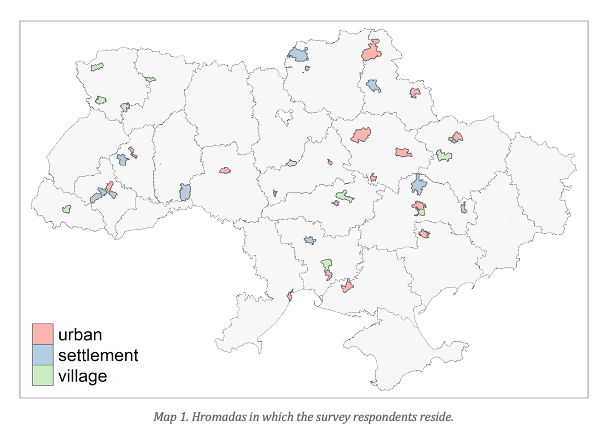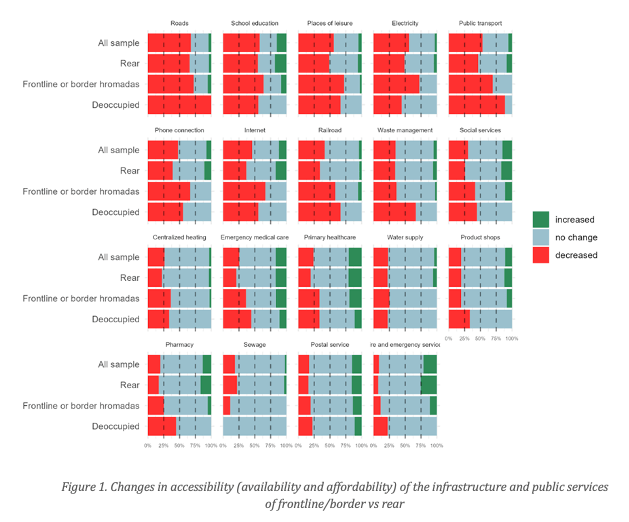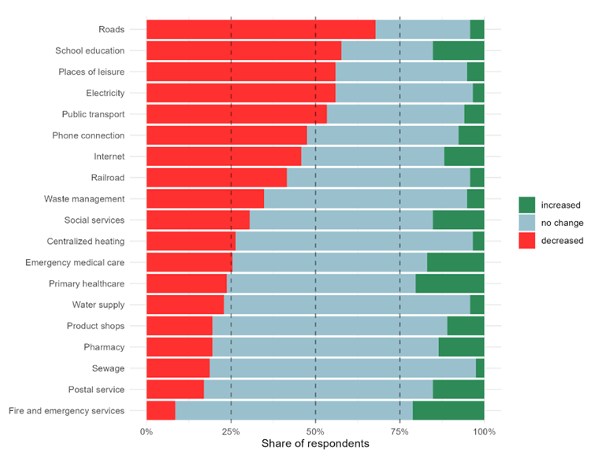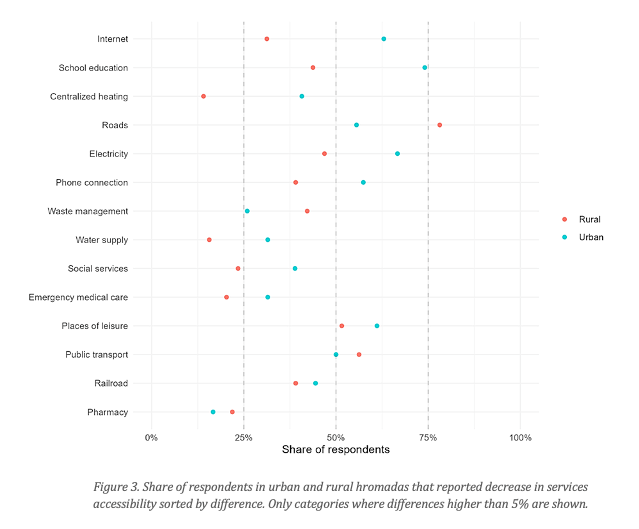- Kyiv School of Economics
- Mapping Ukraine’s democratic space in 40 localities
Mapping Ukraine’s democratic space in 40 localities
The full-scale war in Ukraine has posed significant economic, security and social challenges, differing by scale and type depending on the locality. The effects and disparities caused by these issues could affect the social stability in Ukrainian society and therefore, influence Ukraine’s resilience. Moreover, municipal authorities have proven to be one of the keys to Ukraine’s resilience. With decentralisation reform being the key to foster local decision-making and autonomy, therefore, resilience, it is vital to observe the changes in the local governance during martial law. Hence, the report aims to provide a nuanced understanding of the multifaceted impact of the ongoing war and identify gaps where the support is most needed and crucial for resilience of specific localities.
The report draws on data from a network of 118 local activists in 40 territorial hromadas. The data was captured via survey and in-depth interviews in March and August 2023 respectively. The report provides insights on the existing challenges and coping mechanisms (if present) in the three key domains: (a) the economic wellbeing and access to social infrastructure; (b) security conditions; and (c) an investigation into governance structures and civic engagement.

The data does not claim ‘representativeness’ of the Ukrainian population but rather offers granular insights from key local experts with knowledge bases as activists grounded in their locality. It is an adapted and developed form of expert interview method. In our usage and development of this method we seek to link the meso and macro levels of analysis through developing a cross-country network of activist-experts. As this implies we also utilise an inclusive, encompassing definition of the ‘expert’ as someone active within their local hromada that has accumulated overtime site-specific knowledge bases of the context and its dynamics.
Vulnerable hromadas
We identify some gaps in socio-economic wellbeing and security all over Ukraine, that make some areas particularly vulnerable:
Hromadas affected by the direct military actions, de-occupied and/or close to the frontline and border with Russian Federation and Belarus. In 17 out of 19 measurements, respondents from these hromadas assessed the deterioration in the availability and affordability of infrastructure and public services as more severe than in the rear communities, and it is important to note that this is also true for frontline communities that have not experienced direct occupation. The localities from this group have shown bigger problems with access to economic opportunities and social infrastructure, resulting in their higher reliance on social support networks. These hromadas face a significant challenge when major humanitarian organisations that provide initial assistance and then withdraw their support leave the hromadas to rely on local initiatives. Although hromadas’ representatives have a better grasp of the specific issues and context, combatting all issues can still be challenging without initial support from larger organisations. High rocket and direct military threats together with low access level to shelters also makes them least satisfied with the security situation. In localities where occupation took place there is lower trust to local authorities and police as efficient providers of security.

The Southern macro-region stands out here as the region with the largest number of issues concerning infrastructure access. Notably, 50% of respondents from this region underscored a substantial deterioration. In a more granular breakdown, 86% of participants in the South reported a decline in the accessibility and availability of railroad services, while 71% expressed concerns regarding social services. Furthermore, 57% highlighted issues in emergency medical care, water supply, and waste management.

Small (predominantly rural) hromadas have higher dependency from oblast (regional) centre initiatives and Regional Military Administrations. There is also a higher risk of further deepening of pre-war rooted problems specific for rural areas. While for urban areas the biggest infrastructure issues are war-related – lowering phone and Internet connection, electricity issues, for rural areas the infrastructure issues are intensified pre-war problems with roads/public transport and waste management.

Cooping mechanis
On the other hand, the war catalysed new initiatives and partnerships in response to the challenges posed by the wartime conditions.
• There is a pivotal role of networks and citizen collaboration during wartime in Ukraine. These networks function as indispensable conduits for resilience, enabling communities to effectively navigate the challenges posed by the war, coordinate collective efforts, and address the myriad difficulties that arise. One of the examples of such networks could be neighbourhood collaboration, particularly in hromadas that experienced occupation or were close to the frontline.
• Citizens have joined forces to assist their neighbours who have been left without food or unable to access humanitarian aid. In smaller hromadas where civic organisations were previously absent, such initiatives have the potential to evolve into institutional associations.
• A considerable number of new non-governmental organisations (NGOs) appeared, distinct in its “not just large urban geography” observed during 2014-2015. To sustain these new initiatives, institutional support, particularly financial backing, is crucial. Nevertheless, the issue of activists experiencing burnout and the compelled redirection of organisational efforts toward military support, thus neglecting prior civilian activities, requires attention. Furthermore, the establishment of trust between local activists and authorities remains a challenge, compounded by pre-existing trust deficits and instances of nepotism and corruption.
• There have been notable positive shifts in the collaborative dynamics between non-governmental organizations (NGOs) and local authorities in selected hromadas. Simultaneously, local activists have taken proactive measures to leverage this evolving situation for constructive transformations. Presently, local authorities display an increased willingness to engage with civil society organizations in an official capacity compared to the pre-invasion period, with 55% of activists noting that they collaborate with local government once or twice a month or more frequently. This represents a significant increase, considering that only 31% of these activists engaged in such regular collaboration with municipal authorities before the invasion.
The Authors are researchers of the Centre for Sociological Research, Decentralization and Regional Development of Kyiv School of Economics Institute. The Centre aims to provide high-quality academic and policy research in the topics of local governance, resilience, and development. This research is supported by the Peace and Conflict Resolution Evidence Platform (PeaceRep), funded by the UK Foreign, Commonwealth & Development Office (FCDO) for the benefit of developing countries. The information and views set out in this publication are those of the authors. Nothing herein constitutes the views of FCDO. Any use of this work should acknowledge the authors and the Peace and Conflict Resolution Evidence Platform.
The Peace and Conflict Resolution Evidence Platform (PeaceRep) is a research consortium led by the University of Edinburgh Law School. Our research is rethinking peace and transition processes in the light of changing conflict dynamics in the 21st century.

Project Manager of the Center for Sociological Research, Decentralization and Regional Development

Data Analyst of the Center for Sociological Research, Decentralization and Regional Development

Researcher of the Center for Sociological Research, Decentralization and Regional Development
